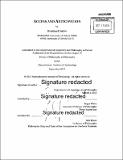| dc.contributor.advisor | Roger White. | en_US |
| dc.contributor.author | Salow, Bernhard, 1988- | en_US |
| dc.contributor.other | Massachusetts Institute of Technology. Department of Linguistics and Philosophy. | en_US |
| dc.date.accessioned | 2016-03-03T21:06:38Z | |
| dc.date.available | 2016-03-03T21:06:38Z | |
| dc.date.copyright | 2015 | en_US |
| dc.date.issued | 2015 | en_US |
| dc.identifier.uri | http://hdl.handle.net/1721.1/101524 | |
| dc.description | Thesis: Ph. D. in Linguistics, Massachusetts Institute of Technology, Department of Linguistics and Philosophy, 2015. | en_US |
| dc.description | Cataloged from PDF version of thesis. | en_US |
| dc.description | Includes bibliographical references (pages 119-126). | en_US |
| dc.description.abstract | Can we always tell, just through reflection, what we should believe? That is the question of access, the central disagreement between epistemic internalists and externalists, and the focus of the dissertation. Chapter 1 gives an argument for access, connecting it with the question of whether we can intentionally bias our own investigations to favour desirable hypotheses. I argue that we can't: since we have to take any known biases into account when evaluating the evidence obtained, attempts to bias our inquiries will be self-undermining. Surprisingly, this explanation fails for agents who anticipate violating access; and such agents can in fact intentionally bias their investigations. Since this possibility remains counterintuitive when we focus on alleged counterexamples to access, this is a serious problem for externalism. Chapters 2 and 3 offer a solution to this problem and related, more familiar, ones. Chapter 2 lays some technical foundations, by investigating iterated knowledge in David Lewis's contextualist theory of knowledge. I show that his account has the surprising consequence that agents cannot attend to "negative access failures", cases in which someone fails to know something without knowing that they fail to know it. Whilst this prediction is prima facie unattractive, I show how it can be defended. Chapter 3 uses this Lewisian treatment of negative access failures to solve our problems for externalism. For I show that these problems arise not from maintaining that, in some situations, agents are unable to tell what they should believe, but rather from maintaining that rational agents can sometimes suspect that they are currently in such a situation or anticipate that they will be in such a situation in the future. Externalists can reject this stronger thesis. To explain how, I sketch a theory of evidence which integrates the Lewisian treatment of negative access failures to predict that agents always have to think that they can tell what they should believe, even though this isn't always true. By rejecting access, but maintaining that agents can never anticipate violating it, this theory reconciles the most attractive features of externalism and internalism. | en_US |
| dc.description.statementofresponsibility | by Bernhard Salow. | en_US |
| dc.format.extent | 126 pages | en_US |
| dc.language.iso | eng | en_US |
| dc.publisher | Massachusetts Institute of Technology | en_US |
| dc.rights | M.I.T. theses are protected by copyright. They may be viewed from this source for any purpose, but reproduction or distribution in any format is prohibited without written permission. See provided URL for inquiries about permission. | en_US |
| dc.rights.uri | http://dspace.mit.edu/handle/1721.1/7582 | en_US |
| dc.subject | Linguistics and Philosophy. | en_US |
| dc.title | Access and anticipation | en_US |
| dc.type | Thesis | en_US |
| dc.description.degree | Ph. D. in Linguistics | en_US |
| dc.contributor.department | Massachusetts Institute of Technology. Department of Linguistics and Philosophy | |
| dc.identifier.oclc | 939918259 | en_US |
